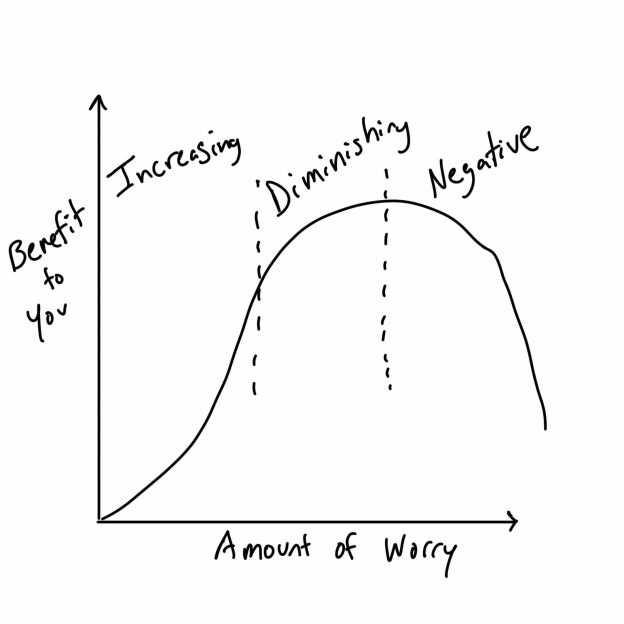Inspired by Naval Ravikant, when I learn life lessons, I try to compress them into a short phrase so I remember the lesson better. Here are 75 of my personal learnings:
—
- Your lowest points might be your greatest opportunities in disguise.
- All truly incredible outcomes start as “crazy” ideas.
- If believing everything happens for a reason makes life better, believe it.
- Only keep tense what absolutely must be. Relax everything else.
- Before they call you visionary, they call you weird.
- Everything useful in the world was created by someone who cared enough to push it into reality.
- Just because all your friends do something, doesn’t mean you should.
- Just because all your friends don’t do something, doesn’t mean you shouldn’t.
- Mix your interests to find your area of world-class potential.
- World-class expertise is more attainable than you think.
- Zoom in unusually far and narrow on anything, and you’ll see things no one has seen before.
- Good ideas aren’t enough – they need to look incredible.
- It’s easier to get a good deal if you have cash in hand, exact change, arm extended.
- Be able to distinguish investments that look like luxuries.
- The true cost of things: (Price Paid – Price Sold For) / (# of Times Used).
- Invest aggressively in tools used daily.
- Money is the worst form of capital. Prefer health, relationships, knowledge, experience.
- Half the battle of making great art is knowing the tools to use.
- People will tell you the tools they use, if you ask nicely.
- Investing aggressively in the right tools will save money in the long run.
- When beginning an art form, try many styles, share, and see what works.
- When you find what works, stop exploring. Create in that style until you get tired.
- Repeat.
- New hobbies can have defined, planned lifetimes.
- But previous pursuits do remain part of your identity.
- Everything you make builds toward your global body of work.
- Your global body of work is a ball of dry kindling, waiting for a spark.
- The bigger the ball of kindling, the bigger the flame.
- The spark might come soon, in decades, or never.
- Being public and meeting many people reduces the risk of the latter.
- You don’t need to be a world expert to generate novelty.
- Remixing is easier than synthesizing from scratch to generate novelty.
- The paradox of art: creative decisions lead to different ends. There is no best end, but some are better than others.
- Your life is a decades-long performance art project.
- A master chef can answer not only the “right” way to make rice, but also: “What if we use half the water? Twice as much? Half the heat?” – because she’s tried.
- Everything good in life comes from people.
- Find a community where it’s normal to do the things you aspire to do.
- Buy your way in if that’s the easiest way.
- Cold email or DM people with gratitude and one hyper-specific question.
- Don’t assume you’ll be ignored. Test it.
- Lack of reply = Test to see how serious you are.
- Don’t rely on your memory for following up. Have a system.
- Don’t rely on your memory, in general. Have a system.
- Mentorship begins the moment they reply.
- Finding mentorship is about making yourself an attractive investment.
- You’re not a nobody; you’re a rocket on the launch pad.
- Show proof of work to de-risk yourself as a mentee.
- Go out of your way to travel to where your mentors live.
- Some seeds take years to sprout, but bear the most incredible fruit.
- Buying something from them is a way to get closer to a potential mentor.
- Being in need is a great way to start conversations with strangers.
- You can invent small needs on a moment’s notice, anywhere.
- For example, simply needing a recommendation.
- Compliments are a great way to start conversations with strangers.
- You can take actions that make it easier for strangers to start conversations with you, like wearing interesting clothes.
- When surrounded by strangers, gravitate toward who shows you warmth.
- Mingling is easier when you’re early to an event.
- The transition from stranger to friend can happen in seconds.
- The connection isn’t crystallized until you’ve followed up later online.
- Reach out to everyone on the internet whose work you admire.
- Move from email to text message to deepen relationships.
- You’re not competing against the best – only those who show up.
- Any great pursuit is a marathon. Learn the art of long-term consistency.
- Genuine passion = endurance.
- Copycats will have weak endurance.
- You can often bypass bureaucracy by showing up in person, early.
- Do things that terrify you.
- Sometimes impossible decisions solve themselves with time.
- Focus less on winning; focus more on not losing. (Warren Buffett)
- Don’t be afraid to exploit your unfair advantages.
- Have a personal agenda.
- When no one has a strong opinion, that’s an opportunity to advance your agenda, if you wish.
- “A healthy man wants a thousand things. A sick man wants one.”
- The only competition is to know yourself as fully as possible, and act with maximum authenticity towards that truth.
- Remember: Millions would switch lives with you in a heartbeat, and readily inherit every single one of your problems.

